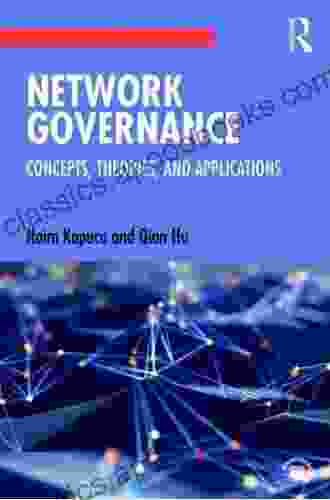The Definitive Guide to Network Governance: Concepts, Theories, and Applications

4.4 out of 5
| Language | : | English |
| File size | : | 5101 KB |
| Text-to-Speech | : | Enabled |
| Screen Reader | : | Supported |
| Enhanced typesetting | : | Enabled |
| Word Wise | : | Enabled |
| Print length | : | 288 pages |
What is Network Governance?
Network governance is a form of governance that involves multiple actors working together to achieve a common goal. These actors can be from different sectors (e.g., government, business, civil society) and may have different interests and perspectives. Network governance is often used to address complex problems that cannot be solved by any one actor alone.
The Benefits of Network Governance
There are many benefits to network governance, including:
- Increased collaboration and coordination: Networks can help to break down silos and foster collaboration between different actors.
- Improved decision-making: Networks can provide a forum for stakeholders to share information and perspectives, which can lead to better decision-making.
- Increased accountability: Networks can help to increase accountability by making it clear who is responsible for what.
- Greater legitimacy: Networks can help to legitimize decisions by involving a wider range of stakeholders in the decision-making process.
- Increased effectiveness: Networks can help to increase the effectiveness of governance by providing a platform for stakeholders to work together to achieve a common goal.
The Challenges of Network Governance
There are also some challenges associated with network governance, including:
- Complexity: Networks can be complex and difficult to manage, especially when there are many different actors involved.
- Power imbalances: Networks can be dominated by certain actors, which can lead to unfair or biased decision-making.
- Lack of accountability: It can be difficult to hold individuals or organizations accountable for their actions in a network setting.
- Lack of legitimacy: Networks can be seen as illegitimate if they do not involve a sufficiently diverse range of stakeholders.
- Lack of effectiveness: Networks can be ineffective if they are not well-managed or if the stakeholders involved do not have the necessary resources or expertise.
Overcoming the Challenges of Network Governance
There are a number of ways to overcome the challenges of network governance, including:
- Building trust: Trust is essential for effective network governance. It can be built by fostering open communication, sharing information, and keeping commitments.
- Managing power imbalances: Power imbalances can be managed by ensuring that all stakeholders have a voice in the decision-making process and by providing support to weaker stakeholders.
- Ensuring accountability: Accountability can be ensured by establishing clear roles and responsibilities, developing performance measures, and providing regular feedback.
- Enhancing legitimacy: Legitimacy can be enhanced by involving a diverse range of stakeholders in the decision-making process and by ensuring that the network is open and transparent.
- Improving effectiveness: Effectiveness can be improved by providing the network with the necessary resources and expertise, and by developing clear goals and objectives.
Network governance is a complex and challenging form of governance, but it can also be very effective. By understanding the benefits and challenges of network governance, and by taking steps to overcome these challenges, you can create networks that are effective, efficient, and legitimate.
Free Download Your Copy Today!
Network Governance: Concepts, Theories, and Applications is the definitive guide to network governance. This book provides a comprehensive overview of the field, including the latest research and best practices. Free Download your copy today and learn how to use network governance to achieve your goals.
4.4 out of 5
| Language | : | English |
| File size | : | 5101 KB |
| Text-to-Speech | : | Enabled |
| Screen Reader | : | Supported |
| Enhanced typesetting | : | Enabled |
| Word Wise | : | Enabled |
| Print length | : | 288 pages |
Do you want to contribute by writing guest posts on this blog?
Please contact us and send us a resume of previous articles that you have written.
 Book
Book Novel
Novel Page
Page Chapter
Chapter Text
Text Story
Story Genre
Genre Reader
Reader Library
Library Paperback
Paperback E-book
E-book Magazine
Magazine Newspaper
Newspaper Paragraph
Paragraph Sentence
Sentence Bookmark
Bookmark Shelf
Shelf Glossary
Glossary Bibliography
Bibliography Foreword
Foreword Preface
Preface Synopsis
Synopsis Annotation
Annotation Footnote
Footnote Manuscript
Manuscript Scroll
Scroll Codex
Codex Tome
Tome Bestseller
Bestseller Classics
Classics Library card
Library card Narrative
Narrative Biography
Biography Autobiography
Autobiography Memoir
Memoir Reference
Reference Encyclopedia
Encyclopedia Wendi Hayman
Wendi Hayman Joshua L Cherniss
Joshua L Cherniss Patrick T Dunleavy
Patrick T Dunleavy Angel Propps
Angel Propps Peter Temin
Peter Temin Kelly Flanagan
Kelly Flanagan Iain M Banks
Iain M Banks John Zeaman
John Zeaman Karen Matteck
Karen Matteck Andy Duerden
Andy Duerden Dennis Herrick
Dennis Herrick B Scott Christmas
B Scott Christmas Simon Pratt
Simon Pratt Olivier Morel
Olivier Morel Ruskin Bond
Ruskin Bond Anne Ripley
Anne Ripley Wendy Hui Kyong Chun
Wendy Hui Kyong Chun Tom Harrison
Tom Harrison Andrew E Kaufman
Andrew E Kaufman Mike Zacchio
Mike Zacchio
Light bulbAdvertise smarter! Our strategic ad space ensures maximum exposure. Reserve your spot today!

 Nathaniel HawthorneThe First 50 Years International Library of African Studies: A Landmark...
Nathaniel HawthorneThe First 50 Years International Library of African Studies: A Landmark...
 John Dos PassosUnleash Your Inner Artist: A Comprehensive Guide to Animal Art with Graphite...
John Dos PassosUnleash Your Inner Artist: A Comprehensive Guide to Animal Art with Graphite... Ed CooperFollow ·5.9k
Ed CooperFollow ·5.9k Leo MitchellFollow ·11.1k
Leo MitchellFollow ·11.1k Tim ReedFollow ·14.9k
Tim ReedFollow ·14.9k Douglas FosterFollow ·9k
Douglas FosterFollow ·9k Steven HayesFollow ·17.6k
Steven HayesFollow ·17.6k Bob CooperFollow ·6.9k
Bob CooperFollow ·6.9k Levi PowellFollow ·19.4k
Levi PowellFollow ·19.4k Edwin BlairFollow ·8.2k
Edwin BlairFollow ·8.2k

 Devin Ross
Devin RossUnlocking the Secrets of the Mind: Brain Mapping...
The human...

 Jacob Foster
Jacob FosterNovel of Misconception, Truth, and Love: A Journey of...
Unraveling the Lies We...

 Benji Powell
Benji PowellThe Only Technique You Will Ever Need: Unlocking the...
By [Author's...

 Pete Blair
Pete BlairUnveiling the Enchanting World of 'Magnolia House' by...
A Literary...
4.4 out of 5
| Language | : | English |
| File size | : | 5101 KB |
| Text-to-Speech | : | Enabled |
| Screen Reader | : | Supported |
| Enhanced typesetting | : | Enabled |
| Word Wise | : | Enabled |
| Print length | : | 288 pages |












